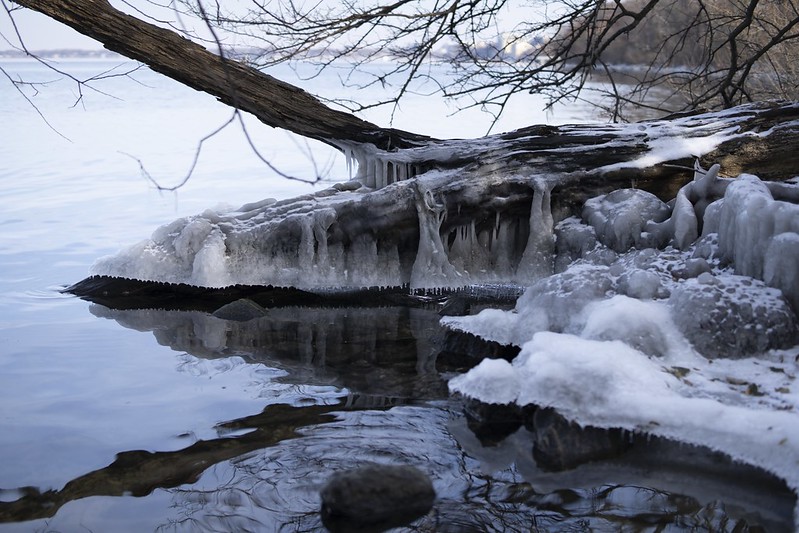
Ice forms on the shore of Lake Mendota. Image credit: Wisconsin Sea Grant
By Maddie Gaudette, Freshwater Collaborative summer research student
This summer, 35 undergraduate students from across the country conducted research with Freshwater@UW, the University of Wisconsin’s cross-site, cross-discipline research opportunities program. Freshwater@UW is supported by the Freshwater Collaborative, Wisconsin Sea Grant, Water@UW–Madison, the Water Resources Institute and the University of Wisconsin–Madison Graduate School. In the final weeks of the program, students reflected on what they learned. Here’s Maddie Gaudette, an undergraduate junior in environment, sustainability and geography from the University of Minnesota Duluth, who worked with Andrea Hicks at UW–Madison.
As a Midwesterner, I understand the importance of a frozen lake; it has brought me some of my fondest memories. From ice fishing with my dad to learning how to skate, ice in winter is a cornerstone of Upper Midwest culture. This connection to frozen lakes is a sentiment that is shared on the University of Wisconsin–Madison campus. Lake Mendota is an established hot spot for winter recreation and festivals, something I have observed firsthand changing as a result of decreased ice cover.
I have found myself drawn to the intersection between observable climate change and public perception of climate change. I could not be more grateful for the research team I have been a part of this summer. Andrea Hicks and my graduate student adviser, Monica, allowed me to expand on my interests in freshwater changes and climate perception, leading me to explore the connections between lake freeze-over rates and local climate perception in the Madison area. I focused on UW–Madison’s beloved Lake Mendota and used state climatology data in addition to local climate perception survey results to research a connection.
Through my research, I found that changes in lake freezing and disruptions to lake activity such as ice fishing and the cancellation of local festivals have had profound impacts on the Madison area, which has increased local climate perception. The trends I found in the climatology data show a decrease in the annual ice coverage of Lake Mendota, with a strong likelihood of continued decreased ice coverage. In Madison, where so much of the city’s culture is connected to the area’s lakes, changes like this can have long-lasting effects on the city’s and university’s culture.
This research has been incredibly engaging; I have felt the reverberations of the changes on Lake Mendota, even as a nonresident. I visited Madison last winter for two different events that both ended up being canceled due to a lack of ice coverage: the Winter Carnival and Lily’s Classic. Both events are university traditions and contribute to the culture of UW–Madison and the Madison area. Understanding how winters along Lake Mendota may be changing gives insight into how to get the community involved in climate issues and, at the very least, aware of climate change impacts in their backyard. Understanding the local changing climate is increasingly important in adapting traditions and recreation for the years to come. While Lake Mendota will long be beloved by the university and the community, my research has indicated that its frozen future may look quite different in the years to come.
The post Lake Mendota serves up lessons in climate change and public perceptions first appeared on Wisconsin Sea Grant.